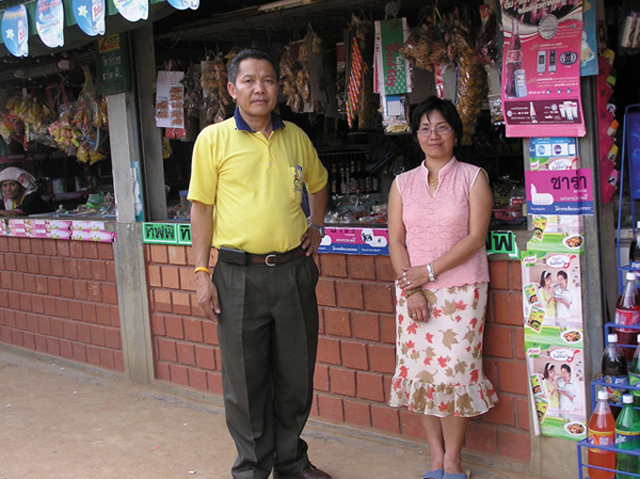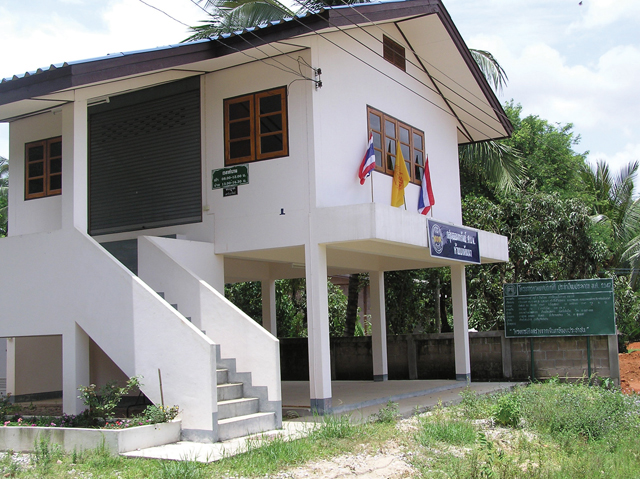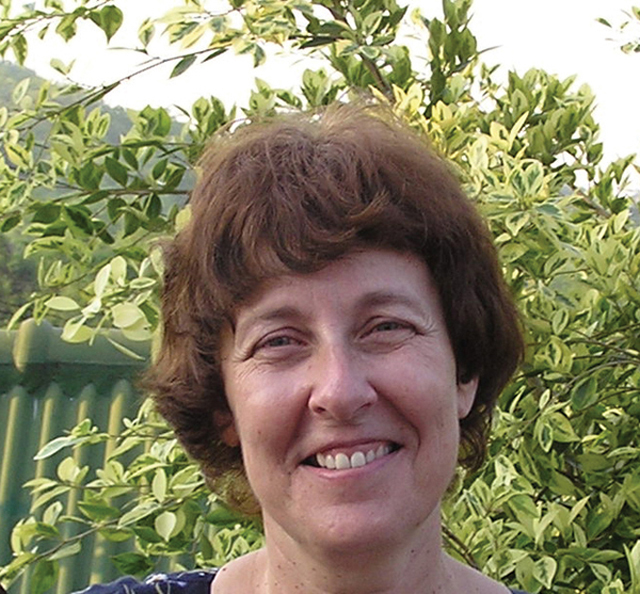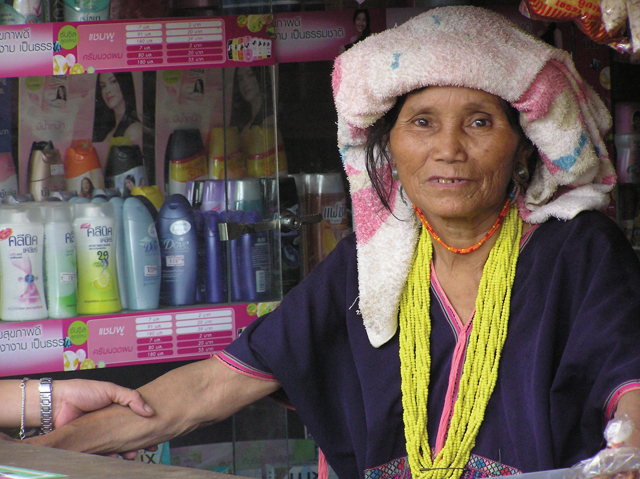A community transformed
Today, Huay Bong is not a village in despair, but a model community, a democratic village of concerned, active citizens
By Susan Keays
September/October 2007
Return to Table of Contents
Print Article
Fifteen years ago, Huay Bong was a typical Karen hill tribe village and Piang Put was a typical Karen woman living there. Like many hill tribe peoples in Thailand, Piang Put wanted, but did not have the means, to get off the poverty treadmill. Today, Huay Bong is “the little village that could” and Piang Put is a grateful villager.
When the Huay Bong community picked up stakes 40 years ago and left the tense Burmese border area, they resettled on a piece of land that offered distance from the Burmese military, but not much else. The soil was so poor that it did not even yield enough for their own needs, let alone provide them with a harvest to sell. For 25 years the farmers worked harder and harder but got poorer and poorer. As a result, there was brisk business at the house of the local loan shark.
 (Credit Susan Keays)
(Credit Susan Keays)Mr. Yamsook Somjai, manager of the Micro Economic Development Project (MEDP), visits with Piang Put at her store in the hill tribe village of Huay Bong, Thailand, where she lives. Piang Put has borrowed 15 times from the village savings cooperative, introduced by MEDP, and each time she has expanded and improved her business.
Meanwhile, Piang Put was dealing with issues besides poverty and hunger. Her husband had never been granted legal status in Thailand—a problem faced by many of the hill tribe peoples—and the border police were constantly harassing him. He was prohibited from leaving the house. Then one day he was forcibly removed and sent back to Burma (Myanmar). Piang Put alone had to provide for their two children and her elderly mother.
Enter Mr. Yamsook Somjai and his Community Spirit Development Project funded by the Baptist Union of Sweden. Mr. Yamsook met with the village leader and the pastor of the Catholic church—Huay Bong is a Catholic village—and offered to help the village establish a fertilizer bank. His project would lend enough money to get started, but the loan was not available to individuals, only to communities.
Seeing the possibility of success, the community banded together to borrow the fertilizer and put it to wise use. Borrowed fertilizer and a united community were all that was needed to steer Huay Bong off the treadmill of poverty. The village paid off its fertilizer loan within five years and made a profit of 4,200 baht (CDN$136). By then, the Community Spirit Development Project had become the Micro Economic Development Project (MEDP) and diversified from rice and fertilizer banks into the area of cooperative savings as well. Huay Bong villagers voted to use their fertilizer profit to begin a savings co-op.
Like its predecessor, MEDP visits the hill tribe villages monthly to offer training programs. The training doesn’t just tackle administrative skills, but also teaches cooperative ideals such as trustworthiness, responsibility, and sympathy for others.
Piang Put was one of her village savings group’s first borrowers. Recognizing that the village had no retail outlets, she borrowed 4,000 baht (CDN$130), bought some food items and toiletries, placed her goods on some makeshift shelves and wove a grass roof to complete her stall and shelter her goods. Sales were so brisk that she quickly repaid the loan and borrowed another 9,000 baht to expand her inventory. Piang Put told me that she has borrowed 15 times from the village co-op, and each time she has expanded and improved her business. Sadly, the joy of her success is tempered by the fact that Piang Put’s husband is still not allowed to live in Thailand, but he does get to visit his family for a day or two most months.
Today, Huay Bong is not a village in despair but a model community, a democratic village of 400 concerned and active citizens. In charge of the bank’s 3,200,000 baht (CDN$104,000) in deposits is a villager so efficient and enthusiastic that she volunteers to go to other villages to teach about and support cooperatives.
 (Credit Susan Keays)
(Credit Susan Keays)The cooperative savings bank in Huay Bong, a source of pride for the whole village.
One family donated a plot of land so that Huay Bong could build a permanent structure to administer the village’s cooperative affairs, but the members didn’t think it was right to accept the land for free. They paid a fair market price for the small plot and the building they erected is a source of pride for the whole village. Both business and community meetings as well as social gatherings are held there.
Not far from the cooperative is the playground, nursery and daycare centre that the villagers voted to build for their children. Piang Put runs her store, but also takes her turn at the daycare tending to the village children while the parents are in the fields tending to their crops.
Every year, on the anniversary of the founding of the fertilizer cooperative, the church in Huay Bong invites 30 faith communities in the area (both Catholic and Buddhist) to an anniversary celebration. Now that truly is a time of Thanksgiving.
Susan Keays is a Scarboro lay missioner serving in Thailand and working with the Micro Economic Development Project.
Hill tribes in Thailand
Hill tribe peoples began crossing into Thailand from countries such as Tibet, China and Burma because of hardship and political tensions in their own countries. Some have been in Thailand for generations.
The Thai government has allowed the tribes to remain, though without citizenship rights and benefits. At least 30 percent of hill tribe peoples still lack basic freedoms: they cannot work because they have no identity papers; they cannot travel freely and are confined to their villages and surrounding areas; they cannot vote; they have no right to medical care and would be breaking the law if they traveled to seek treatment. Until recently, hill tribe people had no right to an education.
A 2002 government survey identified a total of 1,203,149 hill tribe people, living mostly in remote areas in Thailand’s northern and western provinces.
Return to Table of Contents
Print Article

